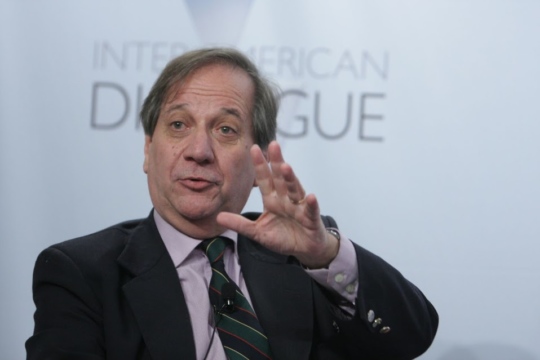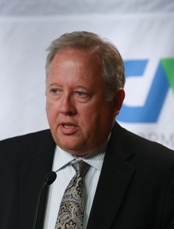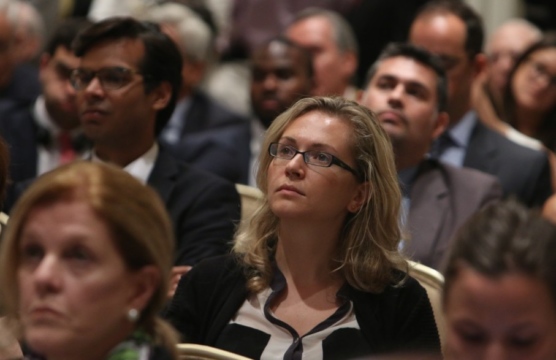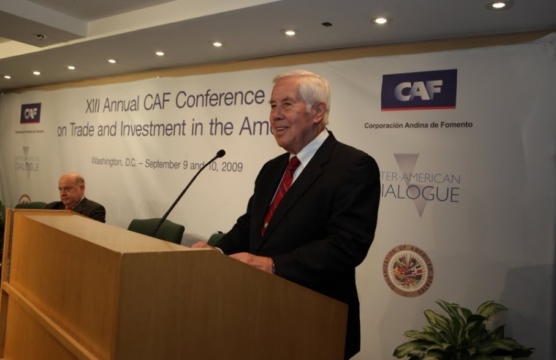
XIV Annual CAF Conference
Summary of the XIV Annual CAF Conference
Remarks as prepared for delivery at the XV Annual CAF Conference.
It’s an honor to be here, with so many longtime friends and colleagues, at the fifteenth annual CAF conference. I know what a thoughtful and high-quality forum this is for discussing issues important to our relations with Latin American and the Caribbean. And, your conversations have unfolded over a time when the region has been going through major transformation, and expanding its links to the broader world in unprecedented ways. Both phenomena are profoundly significant for people throughout the region—and, I think, also throughout the world.
I would like to elaborate on this a little, and then I hope we can spend most of our time in a dialogue on issues you might want to pursue. I am interested in hearing your perspectives, especially on issues raised over the course of your meeting yesterday.
Very temporarily, I find myself in a role that requires me to engage daily—and nightly—on issues and challenges in other parts of the world. As I do so, something that strikes me again and again is how unique the democratic accomplishments of the Americas are. Not just in a regional context, but in a global one.
The Inter-American Democratic Charter, signed 10 years ago in Lima, is a watershed in how the region understands democracy: not just as a system of government, but as a fundamental responsibility of governments toward their citizens. In affirming that democracy is essential to social, political, and economic development, the charter posits a broad and inclusive model for democratic governance. And that model is special in the vast space it gives to societies and individuals to pursue their own visions of success in an ever more competitive world.
Over the last 10 years, there has been a continuing evolution in the Americas from democratic governments to more complete democratic societies. Countries have followed their own unique paths, reflecting distinct histories and cultures, but the aggregate social and political advance has been strong and sustained.
That progress hasn’t been by chance. Secretary Clinton emphasized this point when she spoke to the Council of the Americas in May. “Changes like what we have seen in terms of economic opportunity and democratic reform do not happen by accident…they happen when people decide that they want those opportunities and changes for themselves, and leaders are prepared to lead.” In the Americas, people decided. And many thoughtful leaders led.
As a result, societies evolved; political participation increased; economies grew; the exercise of universal rights expanded; poverty rates declined; the region became more integrated, internally and with the outside world. Countries of the Americas assumed a greater role in world affairs, and contributed more and more to global prosperity and security. As the region’s capacity grew, so did an impulse for effective partnership in the service of shared objectives. Just weeks into office, President Obama committed the United States to a new era of partnership. Over the last two-and-a-half years, we have seen major advances in cooperation across a wide span of priorities shared by people throughout the Americas. We have also seen the emergence of a new architecture of cooperation, what Secretary Clinton called “flexible multilateralism,” that shares responsibility and leadership among increasingly capable partners. This cooperation draws on the experience, wisdom, and capacity of other societies all over the Americas.
I’d like to highlight something about the achievements of the Americas that is worthy of worldwide attention. These transformations happened in a region of tremendous diversity and a long history of inequality. Diversity and inequality, in some parts of the globe, have generated destabilizing and impoverishing conflict, and humanitarian tragedy. The Americas have found ways to unite people and countries, find common cause, and expand opportunity while preserving difference and fostering respect.
It is also significant that, in many parts of the Americas, democracy has emerged as a reaction to authoritarianism and, in its most contemporary manifestation, as a fight for human rights and individual dignity. In some cases, people strengthened democratic societies against backdrops of terrifying criminal violence.
In South America, democracy frequently proceeded from a fight against military regimes over the protection of and respect for human rights. In other words, human rights were not a product of democracy; rather, democracy was a product of the struggle for, and exercise of, human rights.
This has real meaning on many levels.
In the Americas, there is great innovation today as people seek the right constructs to advance regional and sub-regional integration. This can be a positive sum process. It will necessarily always be a work in progress. New or reformed mechanisms that are inclusive, effectively address real needs, promote outward-looking integration, and resolve problems, can be very valuable. Those that nurture divisiveness, or impede the region’s social and economic growth, are unlikely to stand the test of time or garner enduring support.
In this marketplace of new ideas and architecture, it is important not to lose sight of the crucial role democratic principles and rights play in underpinning the success and competitiveness of the Americas. In Santiago last March, President Obama called on all of us to “recommit to defending democracy and human rights in our…countries by strengthening the institutions…[they] need to flourish.”
He was talking about free and fair elections in which people choose their leaders, vibrant legislatures to provide oversight, independent judiciaries that uphold the rule of law, a free press that promotes open debate, professional militaries under civilian control, strong civil societies that hold government accountable, and governments that are transparent and responsive to their citizens.
It is a challenge for all of us, and one that poses a common peril, when any of our countries ignores these needs. This understanding is explicit in the Democratic Charter, which recognizes that democracy is more than majority rule, that simply holding power does not give a leader the license to suppress rights of others, and that leaders must maintain power through consent, and not coercion. We need to speak out when these principles are not respected. We also need to build into regional and sub-regional associations the mandate and means to defend these principles where they may be threatened.
Beyond our Hemisphere, what I would call an “Americas agenda” carries a profound message for the world—especially in North Africa and the Middle East. There, people are demanding, after decades of political stagnation and repression, that their voices be heard. They want to shape their national destinies. They want to acquire the tools for success in their individual destinies, and they want their governments to create and protect space for the individual to be heard. This is the essence of the Arab Spring.
The Americas show that even amidst diversity, and long traditions of exclusion and inequality, it is possible for individuals to demand their human rights and transform societies. This example is powerful, even revolutionary.
I remain extremely optimistic about the region’s recent record of achievement. But, I am also convinced that assuring this trajectory will depend, in part, on our willingness to admit that all of us still face real shortcomings—and need to be serious about developing, collectively and individually, new means of addressing them. This extends to backsliding in the area of rights. We know too many of our citizens continue to endure pervasive insecurity, poor education systems, ineffective democratic institutions, and inadequate fiscal policies. There are still too few people of means paying their fair share of taxes to their government in order to support services for those who will otherwise be mired in poverty. If we don’t face up to these challenges, we could waste this historic opportunity.
By now we know, in all our countries, that a lot of our success hinges on continued progress in several key areas. These include further consolidating accountable and efficient institutions of democratic governance; constant assertion of right of speech, expression, and assembly, regardless of political views. Our success also requires that leaders show courage, and have confidence in their own people. I draw confidence from all the examples, throughout the Americas, of societies and leaders stepping up to these vital challenges.
This is a story of leadership—and the vast new networks of connections it promotes—will shape much of the substance of the upcoming Summit of the Americas in Cartagena next April. The Summit process is very important to us. It provides the only truly hemispheric forum that gathers all the democratically – elected leaders of the Americas. Its trend toward inclusiveness, as civil society and the private sector become more involved in the Summit and its initiatives, show an unprecedented coming together of interests and actors that are shaping the Americas in the 21st century.
As we look to that future, it is important to understand what has happened over the last generation, as the Americas went from an exception to democratic progress to a strong example of it. There are important lessons in that journey, and they will be key to securing the dignity and opportunities that we seek for all our countries and all of our peoples. As we approach the anniversary of 9/11 and the Charter, let us also remember and take pride in the Americas’ commitment to democracy.
Summary of the XIV Annual CAF Conference
Regional integration, social inclusion, and the need for a more competitive business climate—discussed at the XVIII Annual CAF Conference
A detailed review of hemispheric affairs in 2009

 Video
Video
 Video
Video